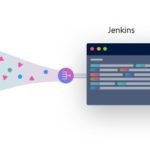How to increase the ansible playbook execution speed? One who is running the playbook against more than 100 hosts could witness the slowness if it’s not fine-tuned. Ansible has few configurable parameters which can reduce the playbook execution time significantly. As a result of the fine-tuning ansible, playbook execution time has been reduced from 4hours […]
Ansible engine
Jenkins- Ansible -Authenticate Server using Protected Passphrase
Ansible is the most widely used configuration management tool. A recent challenge was to authenticate the servers using a protected passphrase. We have a set of servers which can be authenticated only using a passphrase. This article will provide a step by step procedure to authenticate ansible clients using a private key and protected passphrase. […]
Ansible – Executing sequence of commands using Shell Module
How to execute a sequence of ansible commands in a single task using shell or command module? Its quite often needed to run a sequence of commands irrespective of the results. If you would like to automate the VM post-build, we knew that the template doesn’t have specific packages. Some of the configuration files might […]
Downgrading Ansible Engine on CentOS 7/ RHEL 7
How to downgrade Ansible engine on RHEL 7 / CentOS 7 ?. If you install ansible engine from EPEL repository, it will install the latest ansible engine. I had a hard time with latest ansible engine due to incompatibility with specific tasks. For example, Openshift deployment works fine with Ansible engine 2.7 and fails with […]
Using Date and Timestamp Variable in Ansible Playbook
Timestamp plays a crucial role while automating any job. Timestamp variable would be helpful to capture the current date and time (While gathering facts). In Ansible, we might need to create a file or directory based on the timestamp to make it unique. By default, the ansible engine collects timestamp of the remote systems in […]
Ansible – Reboot Server Using Playbook and Wait for come back
Ansible is a simple configuration management tool. Open source community keeps trying to make the code much simpler on the newer version. Prior to Ansible engine 2.7, To reboot the target hosts, we need to define a block of code to reboot the server and wait until the hosts to come back. Most of the time. making the configuration changes or installing […]
How to pass variable from one playbook to another playbook ? Ansible
In Ansible, passing a variable from one playbook to another playbook is not a straight forward. (If the target hosts are different). We might need to get the variable value from one host and use that value against another host in some cases. This article will provide a solution to overcome this kind of tricky situation in Ansible. Here are the scenarios […]
Jenkins – Ansible – Configure Dynamic Inventory
Are you using Jenkins as front-end GUI for Ansible Automation? Have you ever tried the dynamic inventory in Jenkin’s Ansible plugin? Ansible Inventory can be created using the plugin’s dynamic inventory feature. This feature could be very useful when you want to pass hosts as user-defined input and that’s is not part any of the […]
Jenkins – Store Console Output in Linux Filesystem – Artifacts
How to store Jenkins job’s console output in another system? There are much opensource software is available to store the logs and retrieve logs in time. Jfrog is one of the most famous artifact solutions. Here, we will be using native Linux/Unix commands to pull the Jenkins logs and store it in local/NFS filesystem for […]
Jenkins – Rename Build Job Names – Build Name setter
Jenkins job’s build name would be named with the numeric number by default in increment manner. After configuring the Jenkins job, the first build job would be named as “1”, the second job would be named as “2” and so on. Most of the cases, no one prefers to change the default build naming algorithm. […]









